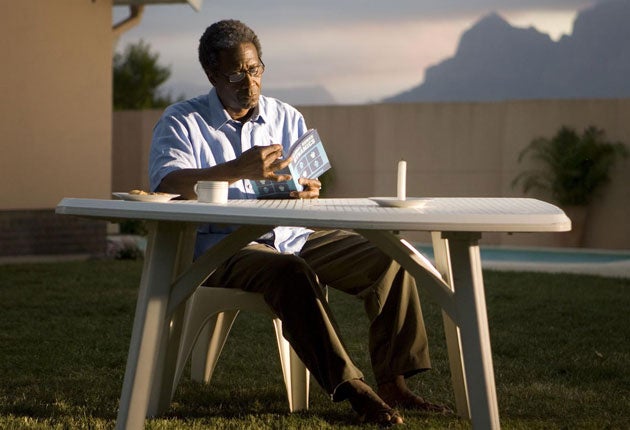Endgame, Channel 4<br>Inspector George Gently, BBC1
The end to apartheid is hammered out in the most unlikely setting in a starrily cast historical drama

People might have stopped building them a century ago, and mostly stopped living in them half a century ago, but the English stately home still looms large in the dramatic imagination. It has structural benefits: as a location for bringing characters together, or for keeping a narrative within simple confines. And it has a Waughian thematic resonance, too, as a symbol of an old, fading world.
In 1988, Mells Park House in Somerset hosted a quiet revolution. Michael Young, then an employee of the British mining company Consolidated Goldfields, chose the estate as the setting for secret talks he'd organised between South Africa's Afrikaner establishment and the African National Congress.
The housekeeper planned to separate the two delegations when assigning them their quarters, but Young insisted she mix them up, "to maximise the opportunity for chance meetings". The stakes were high – the end of apartheid, no less – and it was crucial that he assembled and arranged his players meticulously.
The makers of Endgame, a one-off drama about those talks, did the same. William Hurt, Chiwetel Ejiofor and Jonny Lee Miller (as Young) led a formidable cast that also included Sir Derek Jacobi as Young's boss, Timothy West as P W Botha, Clarke Peters of The Wire as Nelson Mandela, and Mark Strong as Botha's intelligence chief Dr Neil Barnard, the sort of fellow who ripped the filters off his cigarettes before smoking them.
Hurt and Ejiofor played the men staring at one another across the negotiating table at Mells Park, university professor Willie Esterhuyse and Thabo Mbeki. Both were predictably magnificent; Hurt may just have pipped his opponent to the acting honours, but the nobility and charisma of Ejiofor's Mbeki were effective rejoinders to the departing South African president's present-day detractors.
Paula Milne's script skilfully interspersed talk with action. The film opened with Young smuggled into Soweto in the back of a van to seek out the ANC leadership. Car chases, explosions and espionage ensued. And director Pete Travis made good use of the Greengrass aesthetic – handheld camerawork and an edge-of-the-seat soundtrack – to ramp up the tension.
Endgame made a powerful argument for engagement rather than isolation. What began as a ploy by the Afrikaner government to undermine the ANC became, instead, a serious negotiation – thanks, in part, to Young's calm ingenuity. After the meetings, he encouraged the more informal "Glenfiddich diplomacy" that allowed the delegations to get to know each other as (in his words) men, not enemies. Miller, whose boyish looks are at last maturing, gave a performance as admirably discreet as his real-life counterpart's.
In the film's moving final moments, Esterhuyse, Mbeki and their colleagues gathered in Mells Park's plush drawing room to watch the drama they'd facilitated unfolding on television: the release of Mandela, and the lifting of the ban on the ANC. It felt a little like watching Poirot round up his suspects for the big reveal.
For Martin Shaw's latest televisual incarnation, Inspector George Gently, the decrepit Harrison House was a particularly pertinent crime scene. Gently, an old-school copper relocated from London to Northumberland in the Sixties, spends much of his time coming to terms with that decade's speedy social change. In "Gently with the Innocents", the first episode of this second series, what began as a typical country-house mystery metamorphosed into something darker and more modern. An old man had been killed in a frenzied attack at his home, a former orphanage. At first, the detectives assumed financial motivations for the crime; the house, a listed building, had just been sold for redevelopment, and the dead man had opposed the sale.

Watch Apple TV+ free for 7 day
New subscribers only. £9.99/mo. after free trial. Plan auto-renews until cancelled.
ADVERTISEMENT. If you sign up to this service we will earn commission. This revenue helps to fund journalism across The Independent.

Watch Apple TV+ free for 7 day
New subscribers only. £9.99/mo. after free trial. Plan auto-renews until cancelled.
ADVERTISEMENT. If you sign up to this service we will earn commission. This revenue helps to fund journalism across The Independent.
But as they dug deeper, Gently and his sidekick, Sergeant Bacchus, uncovered a dreadful history lurking in the boarded-up cellar of Harrison House. Emphasising the innocence of the times, Gently had to ask one witness whether they understood the term "paedophile".
The fictional case resembled the real events recently exposed at Haut de la Garenne children's home on Jersey, though the original novel, by Alan Hunter, was published presciently in 1970. Hunter, who died in 2005, wrote roughly a book per year between 1955 and 1999, and there are still some three dozen or so Gently stories for Peter Flannery, writer of The Devil's Whore, to adapt for the screen. Thanks to Flannery's script, the perennially watchable Shaw, and the understated period detail, the inspector is a worthy addition to TV policing.
Just as the credits rolled on Endgame, we were told the IRA consulted the ANC on the party's methods when it entered talks with the UK government. And the earlier scenes of chauffeur-driven Jags transporting men to momentous meetings at a country estate recalled the BBC's recent drama Five Minutes of Heaven, about a reconciliation between two rivals from the Irish Troubles. As long as warring factions choose to hold talks in country houses, production companies will continue to make landmark dramas there. Hunter's Harrison House, meanwhile, was torn down – and the denials and self-delusion of the old world with it.
Join our commenting forum
Join thought-provoking conversations, follow other Independent readers and see their replies
Comments
Bookmark popover
Removed from bookmarks